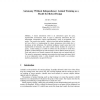1583 search results - page 123 / 317 » Probabilistic User Behavior Models |
129
click to vote
CORR
2002
Springer
15 years 2 months ago
2002
Springer
Many systems that exhibit nonmonotonic behavior have been described and studied already in the literature. The general notion of nonmonotonic reasoning, though, has almost always ...
118
Voted
MSS
2010
IEEE
15 years 22 days ago
2010
IEEE
Distributional analysis is widely used to study social choice in Euclidean models [35, 36, 1, 5, 11, 19, 8, 2, e.g]. This method assumes a continuum of voters distributed accordin...
130
click to vote
ICDCSW
2008
IEEE
15 years 8 months ago
2008
IEEE
Reputation mechanisms are a key technique to trust assessment in large-scale decentralized systems. The effectiveness of reputation-based trust management fundamentally relies on ...
122
click to vote
ACL
2010
15 years 10 days ago
2010
This paper explores the use of clickthrough data for query spelling correction. First, large amounts of query-correction pairs are derived by analyzing users' query reformula...
108
click to vote
WRAC
2005
Springer
15 years 7 months ago
2005
Springer
A classic autonomous robot is an autonomous agent for open, unpredictable environments. Such an agent is inherently autonomous but not independent. Independence implies unpredictab...


